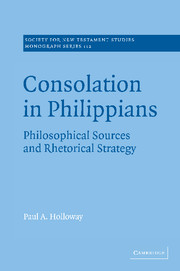Book contents
- Frontmatter
- Contents
- Acknowledgments
- Abbreviations
- Introduction
- Part I Literary and rhetorical contexts
- 1 The integrity of Philippians
- 2 The rhetorical situation of Philippians
- 3 On the genre of Philippians: ancient consolation
- Part II Consolation in Philippians
- Conclusion: an analysis of Philippians
- Bibliography
- Index of modern authors
- Index of passages cited
3 - On the genre of Philippians: ancient consolation
Published online by Cambridge University Press: 06 October 2009
- Frontmatter
- Contents
- Acknowledgments
- Abbreviations
- Introduction
- Part I Literary and rhetorical contexts
- 1 The integrity of Philippians
- 2 The rhetorical situation of Philippians
- 3 On the genre of Philippians: ancient consolation
- Part II Consolation in Philippians
- Conclusion: an analysis of Philippians
- Bibliography
- Index of modern authors
- Index of passages cited
Summary
For there are specific [remedies] customarily spoken regarding poverty, specific remedies regarding life without honor or fame; there are separate forms of discourse respectively for exile, the destruction of one's country, slavery, illness, blindness, and any other mishap that might properly be called a calamity.
Cicero, Tusc. 3.34.81If we accept the above reconstruction of the rhetorical situation of Philippians, and in particular the conclusion that the “controlling exigence” of the letter was the distress the Philippians felt over Paul's imprisonment, then Paul's primary objective in writing to the Philippians will have been to console them or, as Chrysostom puts it, to “rouse them from their despondency over his bonds.” We will therefore conclude our discussion of preliminary matters with a brief survey of ancient consolation. We will begin with a few general comments on the scope and character of ancient consolation. After this we will summarize five theories of consolation current in Paul's day. We will conclude by examining in more detail two consolatory themes that figure prominently in Paul's consolation of the Philippians.
Ancient consolation: some general observations
The sources
Consolation, the combating of grief through rational argument, was widely practiced in the ancient world and is well attested in both Greek and Latin sources. Its origins predate our earliest evidence, since already in Homer we find the skillful use of consolatory topoi. However, judging from extant materials it was not until the late fifth and early fourth centuries that the problem of grief began to be addressed systematically.
Doxographical tradition credits a number of important figures from this period with compositions that were either directly or indirectly consolatory.
- Type
- Chapter
- Information
- Consolation in PhilippiansPhilosophical Sources and Rhetorical Strategy, pp. 55 - 84Publisher: Cambridge University PressPrint publication year: 2001



